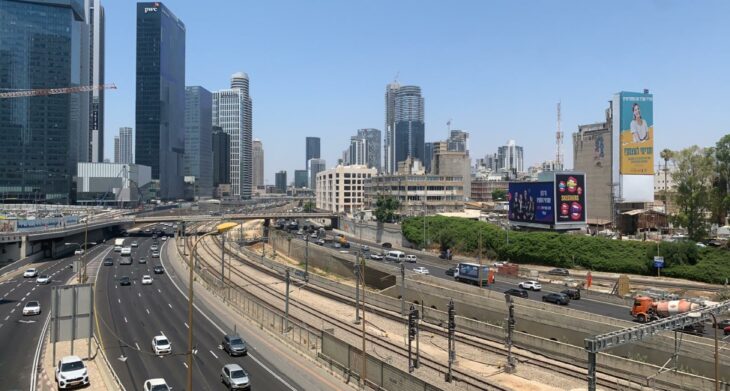The Israeli public is livid, following the government’s failure to enact the Metro Law before the dissolution of the Knesset. Despite the fact that its immense importance is undisputed on all sides of the political spectrum, the law has fallen victim to shortsighted and petty political considerations. The urban planning councils are now in a state of chaos, the unbearable traffic in Gush Dan will only get worse, and apartment prices in the region are expected to skyrocket.
Last week, both citizens and politicians were fuming over the outgoing Knesset’s failure to approve the Metro Law before the government was officially dissolved. The anger stemmed largely from the fact that there is a broad census on the need for this critical legislation, without which there will be no metro system in Gush Dan, and yet it did not go through only because of petty political interests. While the coalition sought to ratify the law, the Opposition opposed it as part of the negotiations around setting a date set for the upcoming elections. According to media reports, several “strong people” in the Likud who live in Ra’anana and oppose the city’s metro route played a major role in blocking the enactment of the law. Either way, the coalition did not do everything in its power to push it ahead, and as of today, the legislation has been postponed to an unknown date.
This is a prominent example of how severe polarization in the Israeli political system stands in the way of cooperation, even around the most non-divisive issues that directly impact the well-being of citizens. In this case, we are referring to a mass public transportation system in the Gush Dan area, the commercial and economic center of the country. Without the rapid advancement of the necessary infrastructure, which is dependent on the passing of the Metro Law, this region will not be able to develop as needed – and its residents will suffer.
So, what exactly is the Metro Law?
While it does not impact the planning of the Metro system, ab underground mass transit system, the Metro Law regulates all aspects involved in the execution of this huge project. The plans for the Gush Dan Metro currently include three lines (M1, M2, M3) that span dozens of cities, from Kiryat Ekron and Rehovot in the south to Kfar Saba and the Arab city of Tira in the north, and from the Mediterranean Sea in the west to Yehud-Monosson and Ben Gurion Airport in the east. The relevant bodies will be able to continue planning the lines, regardless of the status of the law, but as we all know, plans are useless if there is no way of implementing them – and without the Metro Law, that is where we stand.
Among other things, the Metro Law outlines the sources of funding for the project, which is currently budgeted at about NIS 150 billion, but will probably end up costing more than that. About 50% is expected to come from the State budget and the other half from the land itself – from increased improvement levies of up to 75% on landowners building near the Metro, granting more building rights in the area surrounding the Metro, and more. The law also specifies rapid procedures which will allow the operating entities to expropriate the land needed for the project from private landowners, as well as how landowners affected by the project will be compensated. So, as long as there is no Metro law, there will be no Metro.
Passengers: Expect delays
The main implication of not passing the law is obviously the delay in carrying out the project. According to the current schedule, the Metro was supposed to begin operations in 2032, about a decade from now. Of course, this was only an estimate, and if we look at how projects of this scope generally unfold in Israel, it is likely that the Metro would not be rolling the tracks before 2034-35. However, until the Metro Law is enacted, the State cannot begin taking the steps required to begin the project, such as expropriating the land. Naturally, by postponing the passing of the law to an unknown date, the powers that be have also delayed the opening of the Metro to an unknown date.
Chaos for the urban planning committees
Another significant result of the Knesset’s failure to approve the law is the utter chaos that is expected to hit the planning and construction bodies in the central region. Over the course of the past year, the district and local committees have outlined all future building plans based on the fait accompli that the Metro would begin running in about a decade from now. This is especially true in the areas surrounding the Metro stations, where the committees have granted building rights for the construction of large office and residential towers, as well as shopping centers. It was assumed that these locations would be easily accessible without the use of a private car. Failure to pass the law will now lead to a planning stalemate in these areas, and the committees will be forced to wait and see what will happen next. Meanwhile, business activity in these areas may slow down until the picture becomes clearer.
Rising real estate prices
Finally, the freezing of the law will likely have an effect on housing prices, both in the heart of Gush Dan and in the surrounding cities that the Metro is supposed to serve. Cities such as Rehovot, Nes Ziona, Ramla-Lod, Kfar Saba, and Tira were expected to gain quick and easy access to the center of Gush Dan via the Metro, which would bring a wave of development and an increase in the supply of apartments. In the heart of Gush Dan itself, the impact will be even more dramatic, as the delay in construction of the Metro will lead to even heavier traffic and congestion than there already is. Consequently, the public will continue to try to live as close to employment centers as possible, which will naturally lead to rising real estate prices in these areas.
Although the chances are slim, the Knesset still can still technically approve the Metro Law, despite the fact that it has been officially dissolved. We certainly hope that the politicians will make this a priority, otherwise, the Israel real estate market, and perhaps the Israeli economy as a whole, will bear the scars of freezing the Metro Law for many years to come.








